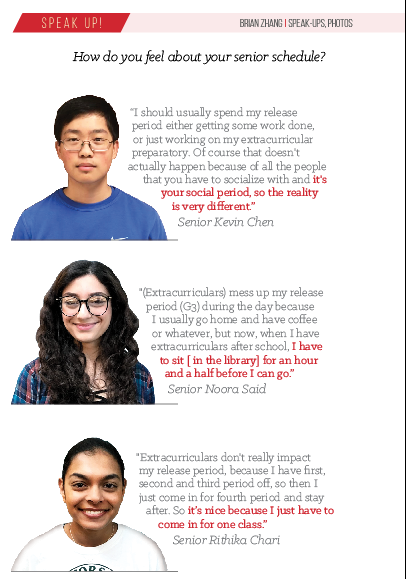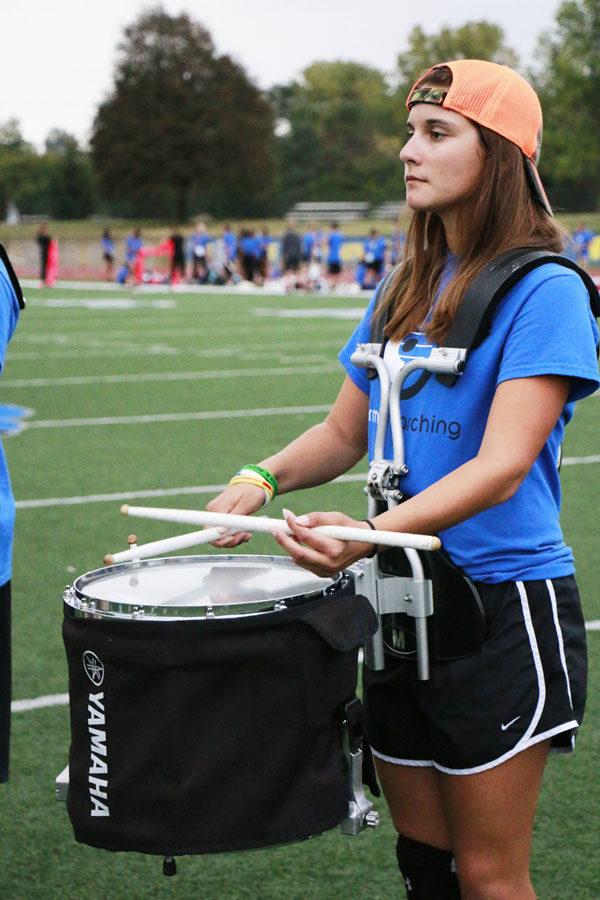With senior year at this school comes new experiences and exclusive freedoms. One of such reserved opportunities includes senior scheduling in the Transition to College Program (TCP). First implemented last school year, seniors have the option to enlist in the Transition to College Program, and accordingly modify their schedules, so long as they take a minimum of four required weighted classes.
For most seniors, the reason they enlist in the TCP is to have a more relaxing senior year in taking only a select few classes. However, for TCP senior Syd Holtzapple, her extracurriculars prevent her from fully experiencing the “laid-back” aspect commonly associated with the TCP’s senior symposium scheduling.
“Being in marching band, I have to attend both before and after-school practices,” Holtzapple said. “Since I have G1 release period, this is a problem because instead of sleeping in, I now have to wake up really early to go to practice on Gold Days.”

Holtzapple said because of her participation in marching band, she feels an inconvenience in her schedule.
“Morning practice ends really close to the start of first period, so I end up staying for G1 even when I’m supposed to have it off,” Holtzapple said. “It’s not worth the time to drive back home and then drive straight back to school for my next classes.”
Holtzapple is not alone in this situation. TCP senior JJ Shaw said he also faces a conflict in his senior symposium schedule due to his extracurriculars.
“I’m on Carmel’s tennis team and practice for the team is always right after school,” Shaw said. “But there’s a problem because I have B4 as a release period and because of practice, I can’t go home during B4.”
Like Holtzapple, Shaw said his extracurricular activity is inconvenient in enabling him to fully enjoy his senior schedule.
“It kind of sucks that I can’t go straight home during B4,” Shaw said. “It’s just not convenient time-wise to drive back home and then come back to the tennis courts all in one period.”
According to student counselor Bettina Cool, however, TCP students in these type of situations actually do receive the full benefits the TCP program has to offer, even if they can’t fully enjoy the time conveniences of sleeping in and leaving school early.
“Many CHS seniors have a misconception of what the Transition to College Program is really for,” Cool said. “ This program isn’t to get extra sleep or homework time, but rather it’s to give seniors a realistic experience of what college will be like.”
For advice, Cool said she would suggest that these TCP seniors with inconvenient schedules manage their time better through planning.

“These seniors have to understand that things don’t always go their way,” Cool said. “They have to go with the flow, better manage their time and deal with their time inconveniences through planning. That’s exactly how college is going to work as well.”
Nonetheless, Holtzapple said she believes the school administration should still provide TCP students who participate in extracurricular activities with priority in choosing the timing of their release periods.
She said, “I think it would be fair if all TCP seniors in my situation could have priority in choosing release periods that are in the middle of the day. That way, it will okay to leave school and go back home without worrying too much about having to come right back to school.”
Similarly, Shaw said that it would be beneficial if TCP students in these types of situations could be given priority in receiving release periods in the middle of the day.
“It would be nice if we were given release periods that were in the middle of the day,” Shaw said. “If I had my release periods then, I could definitely have a more convenient schedule that fits in with my after-school tennis practice.”
Despite her grievances, however, at the end of the day Holtzapple said the schedule inconvenience that marching band provides still does not make the extracurricular activity worth dropping.
“I’m sad that I can’t stay home and sleep in during my G1 release period,” she said. “But even then, this situation definitely doesn’t make it right to just drop out of marching band.”

































![AI in films like "The Brutalist" is convenient, but shouldn’t take priority [opinion]](https://hilite.org/wp-content/uploads/2025/02/catherine-cover-1200x471.jpg)









































![Review: “The Immortal Soul Salvage Yard:” A criminally underrated poetry collection [MUSE]](https://hilite.org/wp-content/uploads/2025/03/71cju6TvqmL._AC_UF10001000_QL80_.jpg)
![Review: "Dog Man" is Unapologetically Chaotic [MUSE]](https://hilite.org/wp-content/uploads/2025/03/dogman-1200x700.jpg)
![Review: "Ne Zha 2": The WeChat family reunion I didn’t know I needed [MUSE]](https://hilite.org/wp-content/uploads/2025/03/unnamed-4.png)
![Review in Print: Maripaz Villar brings a delightfully unique style to the world of WEBTOON [MUSE]](https://hilite.org/wp-content/uploads/2023/12/maripazcover-1200x960.jpg)
![Review: “The Sword of Kaigen” is a masterpiece [MUSE]](https://hilite.org/wp-content/uploads/2023/11/Screenshot-2023-11-26-201051.png)
![Review: Gateron Oil Kings, great linear switches, okay price [MUSE]](https://hilite.org/wp-content/uploads/2023/11/Screenshot-2023-11-26-200553.png)
![Review: “A Haunting in Venice” is a significant improvement from other Agatha Christie adaptations [MUSE]](https://hilite.org/wp-content/uploads/2023/11/e7ee2938a6d422669771bce6d8088521.jpg)
![Review: A Thanksgiving story from elementary school, still just as interesting [MUSE]](https://hilite.org/wp-content/uploads/2023/11/Screenshot-2023-11-26-195514-987x1200.png)
![Review: "When I Fly Towards You", cute, uplifting youth drama [MUSE]](https://hilite.org/wp-content/uploads/2023/09/When-I-Fly-Towards-You-Chinese-drama.png)
![Postcards from Muse: Hawaii Travel Diary [MUSE]](https://hilite.org/wp-content/uploads/2023/09/My-project-1-1200x1200.jpg)
![Review: "Ladybug & Cat Noir: The Movie," departure from original show [MUSE]](https://hilite.org/wp-content/uploads/2023/09/Ladybug__Cat_Noir_-_The_Movie_poster.jpg)
![Review in Print: "Hidden Love" is the cute, uplifting drama everyone needs [MUSE]](https://hilite.org/wp-content/uploads/2023/09/hiddenlovecover-e1693597208225-1030x1200.png)
![Review in Print: "Heartstopper" is the heartwarming queer romance we all need [MUSE]](https://hilite.org/wp-content/uploads/2023/08/museheartstoppercover-1200x654.png)




